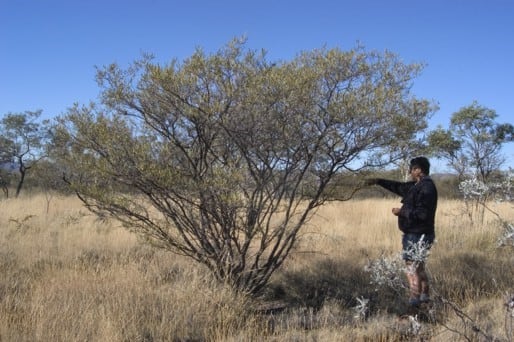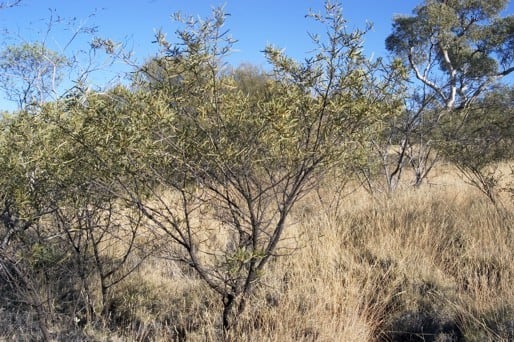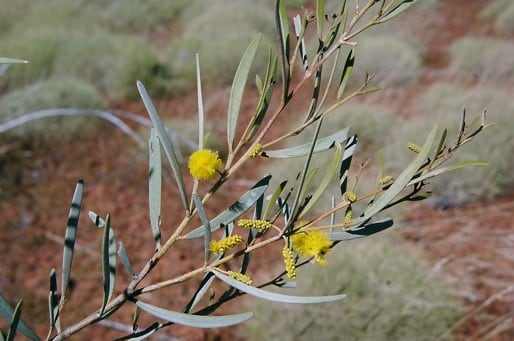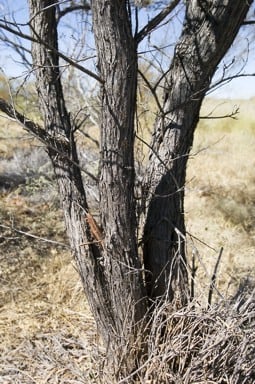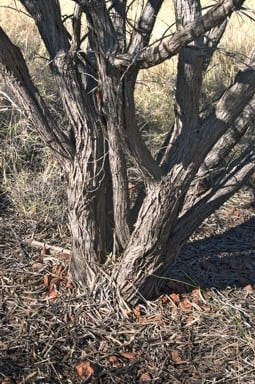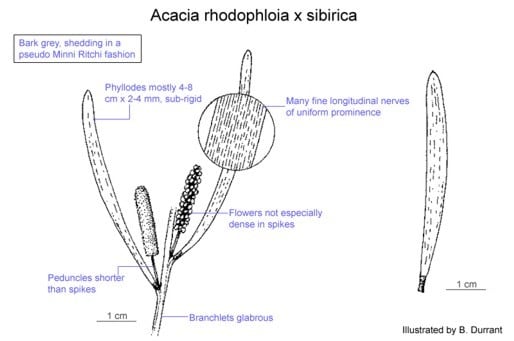Acacia rhodophloia Maslin x Acacia sibirica S.Moore
WATTLE
Acacias of Australia
Family
Fabaceae
Distribution
Confined to the Pilbara region of north-western W.A. where it occurs at a few localities in the Hamersley Ra. between Newman and the general vicinity of Tom Price; also occurs on Balfour Downs Stn (c. 150 km NE of Newman).
Description
Shrub or small tree 1.5–4 (–5) m high. Bark grey, flakey or exfoliating in a pseudo ‘Minni Ritchi’ fashion (i.e. peeling in strips that are often slightly recurved at the ends), longitudinally fissured towards base of oldest plants, smooth on upper branches. Branchlets glabrous. Phyllodes linear to narrowly oblong or narrowly elliptic, ending in a hard, innocuous point, sub-rigid, ascending to erect, straight to shallowly incurved, (3–) 4–8 (–9) cm long, usually 2–4 (–6) mm wide, glabrous; longitudinal nerves numerous, fine, close together and of uniform prominence. Inflorescences simple; peduncles 3–8 (–10) mm long, mostly glabrous; spikes 10–30 mm long, light golden, the flowers sub-densely arranged. Flowers 5-merous; calyx 1/3–½ length of corolla, very shortly dissected into triangular lobes. Pods linear to narrowly oblong, flat, scarcely raised over seeds, straight-edged or slightly constricted between the seeds, 4–6 cm long, (4–) 5–6 (–8) mm wide, thinly coriaceous-crustaceous, glabrous, light brown. Seeds longitudinal to longitudinally oblique, 4–5 mm long, dark brown to black; aril presumably white when fresh but drying dull yellow.
Phenology
Flowers sporadically May–Aug.
Habitat
Grows on low hilly country in skeletal red-brown loam.
Specimens
W.A.: Immediately S of Marandoo Mining camp, c. 3 km S of Mt Bruce, C.G.Dawe 216 (BRI, CANB, K, NSW, PERTH); Balfour Downs Stn, NE of Newman, B.R.Maslin 8861 (PERTH).
Notes
The hybrid status of this entity is based on field observations and morphology, especially the bark. Indeed, in the absence of knowing bark characteristics it is often extremely difficult to recognize. This putative hybrid is always found in association with A. rhodophloia but only rarely is A. sibirica also present in these populations (although it is common in the general area where the hybrid grows). Acacia rhodophloia is most readily recognized by its red ‘Minni Ritchi’ bark which often extends to the upper branchlets, and also its often broad phyllodes (mostly 4–10 mm wide). However, distinguishing the putative hybrid from A. sibirica is more difficult, the most reliable feature being the absence of ‘Minni Ritchi’ bark. See B.R.Maslin et al., Wattles of the Pilbara CD-ROM (2010) for further details. Most collections of the putative hybrid are from the Hamersley Ra. where its phyllodes measure 2–4 (–6) mm wide (suggesting that it is the narrow phyllodes form of A. sibirica that are implicated in the hybridity in that region) but on Balfour Downs Station the putative hybrids have phyllodes 8–10 (–13) mm wide, suggesting that it is the normal form of A. sibirica involved there.
Specimens with linear phyllodes might be confused with A. adsurgens × rhodophloia but are distinguished by peduncles c. equal in length to the spikes (peduncles clearly shorter than the spikes in A. rhodophloia × sibirica) and narrower pods. Some of the plants referred to A. sibirica variant 2 by B.R.Maslin, Nuytsia 4: 99 (1982), belong to A. rhodophloia × sibirica.
FOA Reference
Flora of Australia Project
Author
B.R.Maslin
This identification key and fact sheets are available as a mobile application:
URL: https://apps.lucidcentral.org/wattle/
© Copyright 2018. All rights reserved.
